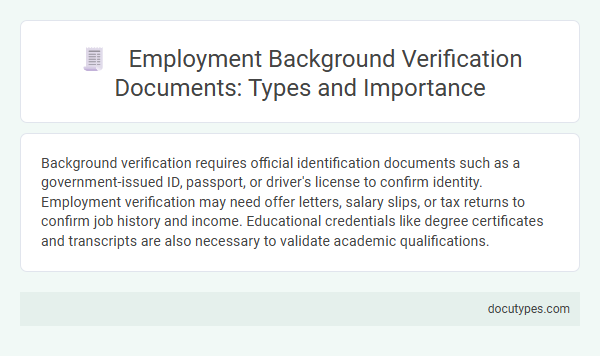Background verification requires official identification documents such as a government-issued ID, passport, or driver's license to confirm identity. Employment verification may need offer letters, salary slips, or tax returns to confirm job history and income. Educational credentials like degree certificates and transcripts are also necessary to validate academic qualifications.
Introduction to Employment Background Verification
Employment background verification is a crucial step employers take to ensure the authenticity of a candidate's credentials and work history. This process helps maintain a trustworthy and competent workforce by validating key personal and professional details.
- Identity Proof - Documents like a government-issued ID or passport confirm the candidate's identity during background checks.
- Educational Certificates - Academic transcripts and degree certificates verify the candidate's claimed qualifications and education history.
- Employment Records - Previous employer references, offer letters, and salary slips validate work experience and professional background.
Why Employment Background Checks Matter
Employment background checks require specific documents such as government-issued identification, educational certificates, and previous employment records to verify your credentials accurately. These documents ensure that the information provided by candidates matches official records, reducing the risk of fraudulent claims. Background checks matter because they help employers make informed decisions, protect company reputation, and maintain a safe workplace environment.
Key Employment Verification Documents
| Document Type | Description | Purpose in Background Verification |
|---|---|---|
| Employment Offer Letter | Official letter issued by the employer detailing job position, start date, and terms of employment. | Confirms job offer authenticity and employment terms for verification. |
| Pay Slips | Monthly or periodic salary statements provided by the employer. | Validates salary history and employment continuity. |
| Employment Certificate | Formal document certifying periods of employment, job title, and responsibilities. | Verifies employment duration and job roles held. |
| Joining Letter | Letter confirming the candidate's acceptance and joining date at the company. | Used to verify official employment commencement. |
| Relieving Letter | Document confirming release from previous employer, indicating end of employment. | Ensures proper separation and no overlapping employment. |
| Appointment Letter | Letter outlining the terms and conditions of employment offered by the organization. | Confirms initial employment agreement and job specifications. |
| Government-issued Identification | Documents such as passport, driver's license, or national ID card. | Verifies candidate identity alongside employment documents. |
Identity Proof Documents
Identity proof documents are essential for employment background verification to confirm the applicant's personal details. Commonly accepted identity proofs include government-issued IDs such as passports, driver's licenses, and national identity cards.
These documents help verify the candidate's name, date of birth, and address, ensuring authenticity. Employers may also request Aadhaar cards or voter ID cards as valid identity proof during the verification process.
Educational Qualification Certificates
Educational qualification certificates are essential documents required for background verification during employment processes. These certificates validate the candidate's academic achievements and ensure authenticity of their educational claims.
- Degree Certificates - Official documents issued by universities or colleges confirming the successful completion of a degree program.
- Mark Sheets/Transcripts - Detailed records of the candidate's academic performance in each subject or semester.
- Diploma Certificates - Certification for vocational or technical courses that support the candidate's professional qualifications.
Employers rely on these educational documents to authenticate the candidate's credentials and eligibility for the job role.
Employment History Records
Employment history records are essential documents required for background verification. These records typically include previous job titles, dates of employment, and employer contact information. Your accurate employment history helps verify your professional experience and qualifications during the hiring process.
Criminal Background Documents
Background verification for employment often requires specific criminal background documents to ensure your record is clear. These documents help employers assess any criminal history that might affect job suitability.
- Police Clearance Certificate - Issued by local law enforcement, this certificate confirms the absence of any criminal record in your jurisdiction.
- FBI Criminal Record Check - A federal-level background check providing details on any national criminal offenses.
- Court Record Extracts - Official documents from courts showing any past convictions or ongoing cases relevant to your background.
Address Proof and Residential Verification
Background verification for employment typically requires documents that confirm your identity and residential address. Address proof is essential to validate your current living situation during this process.
Common documents accepted as address proof include utility bills, rental agreements, and bank statements dated within the last three months. Residential verification may also involve an in-person confirmation or a letter from a recognized local authority. Providing accurate and up-to-date documents ensures a smooth and efficient background check.
Professional License and Certification Verification
Professional license and certification verification require official documents issued by authorized bodies. These documents confirm your qualifications and eligibility to perform specific professional duties.
Commonly accepted proofs include copies of current licenses, certificates, or registration cards. Employers use these documents to ensure compliance with industry standards and regulatory requirements.
What Type of Document Is Required for Background Verification? Infographic

